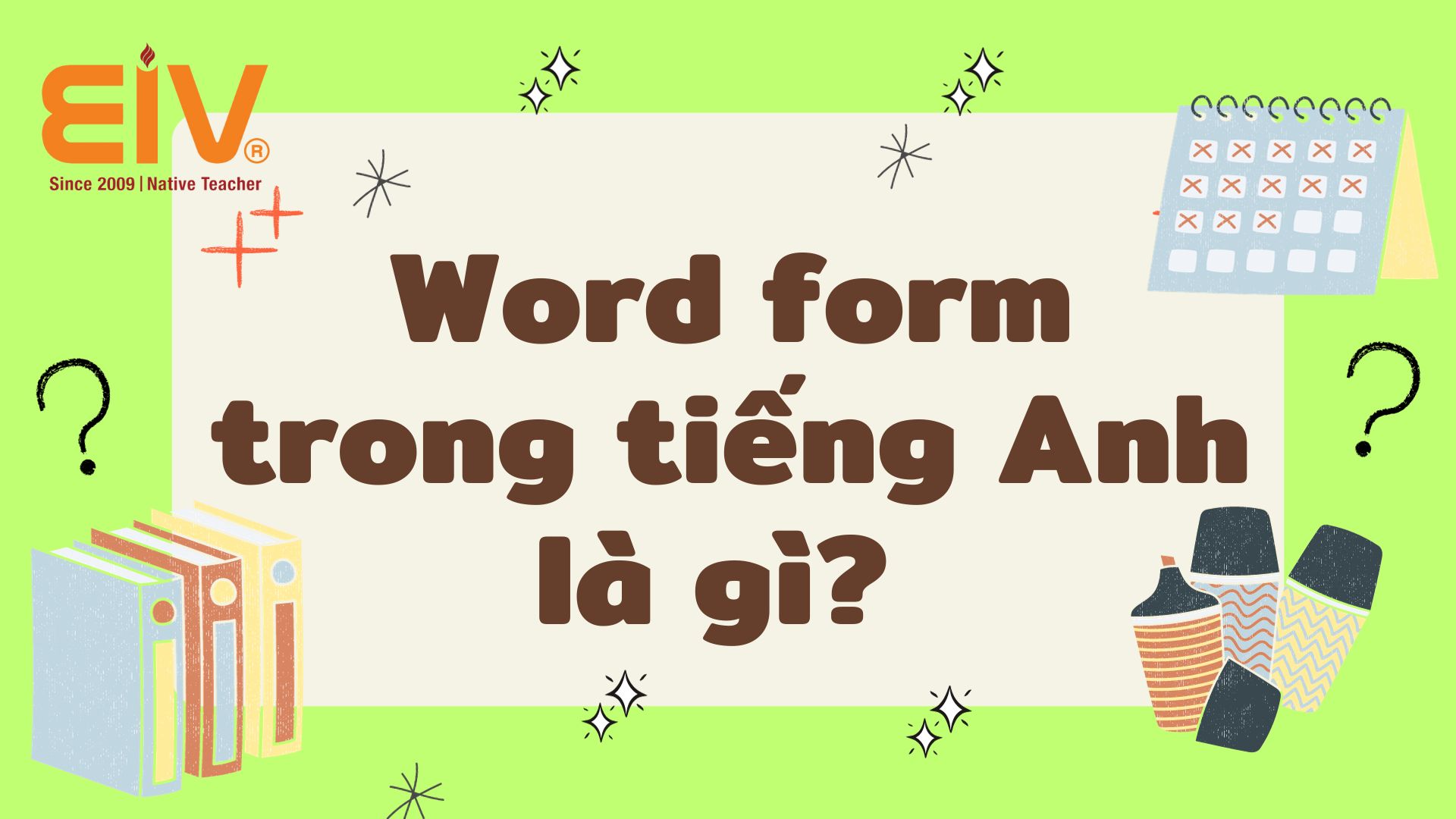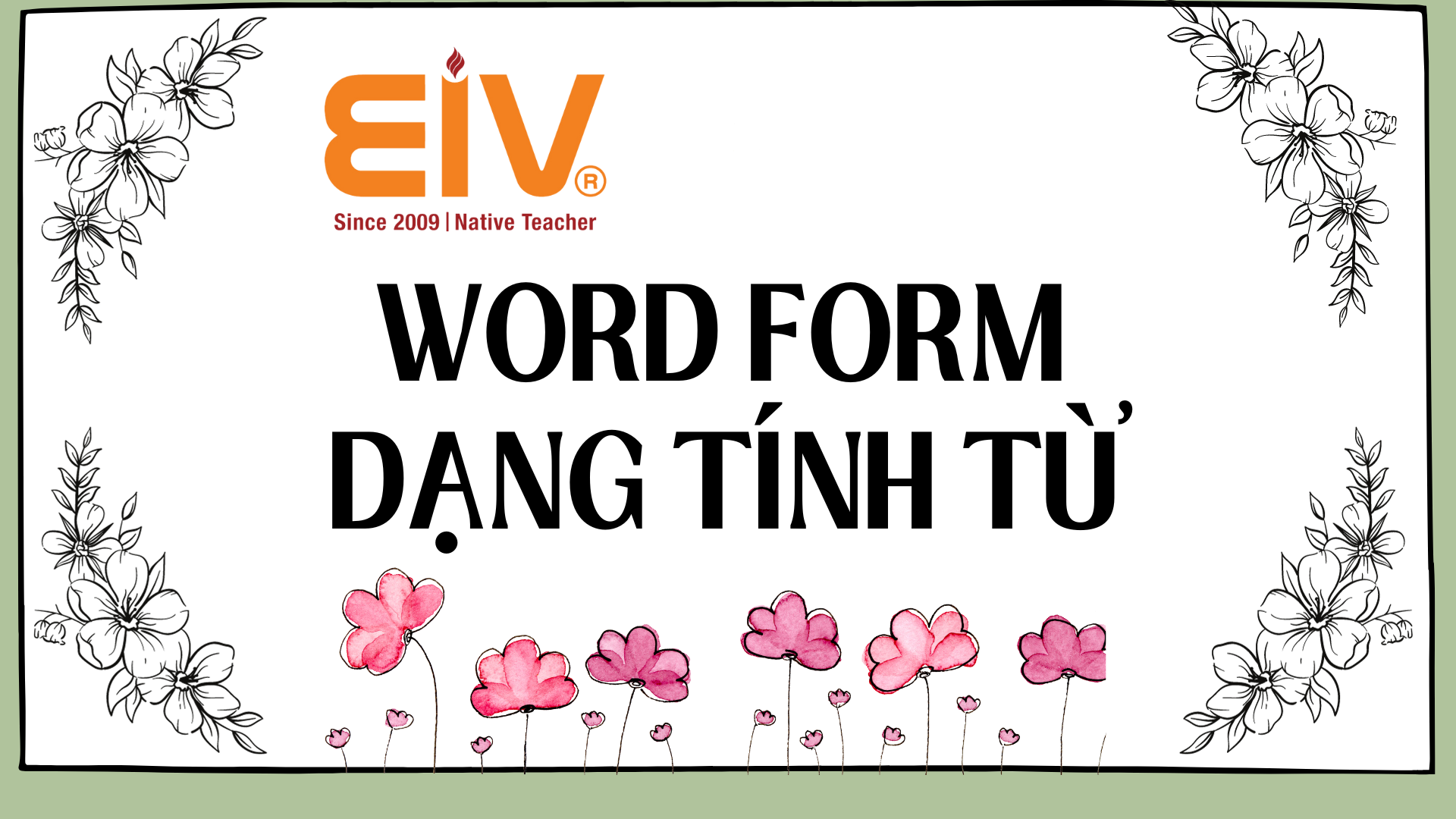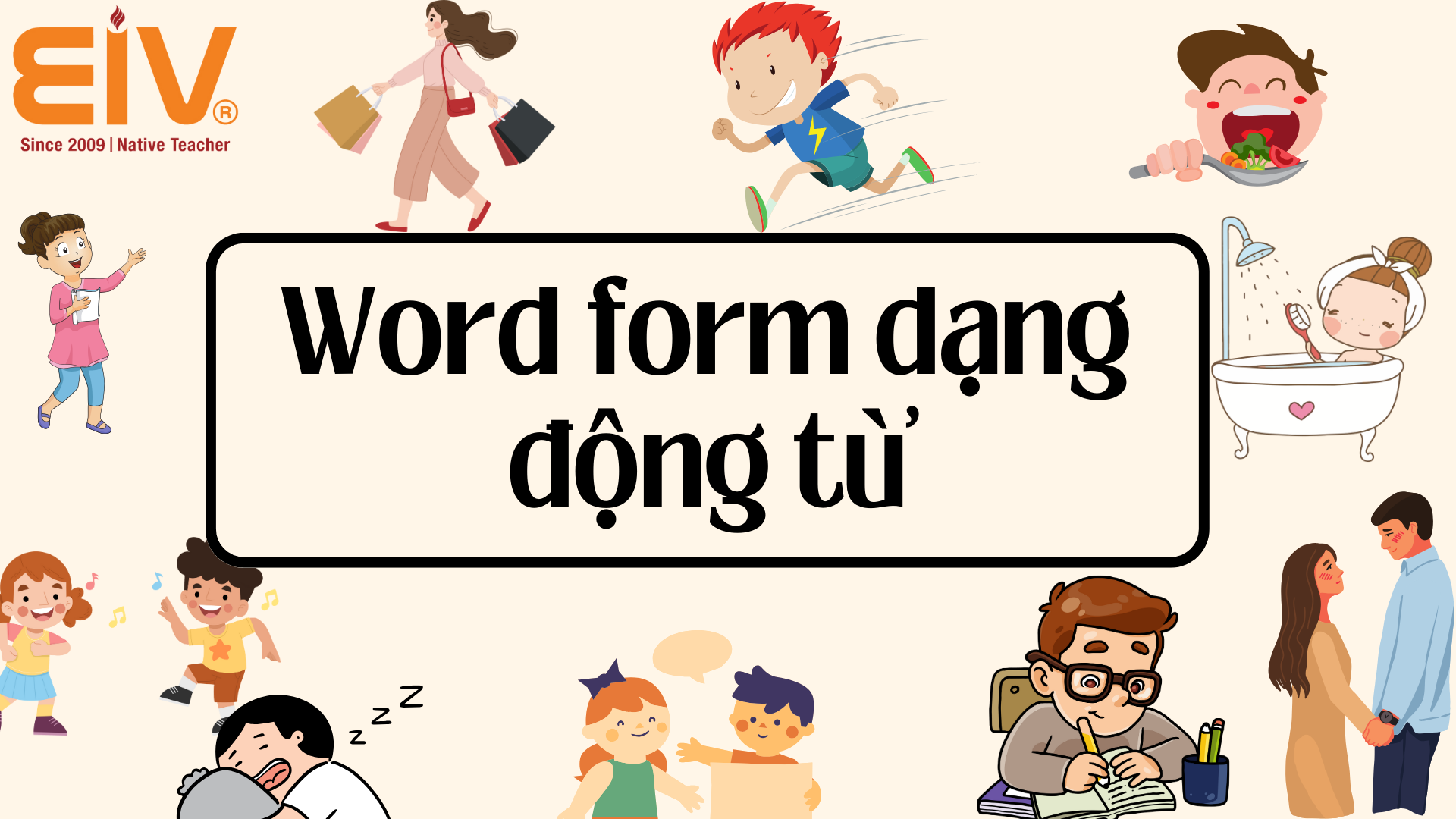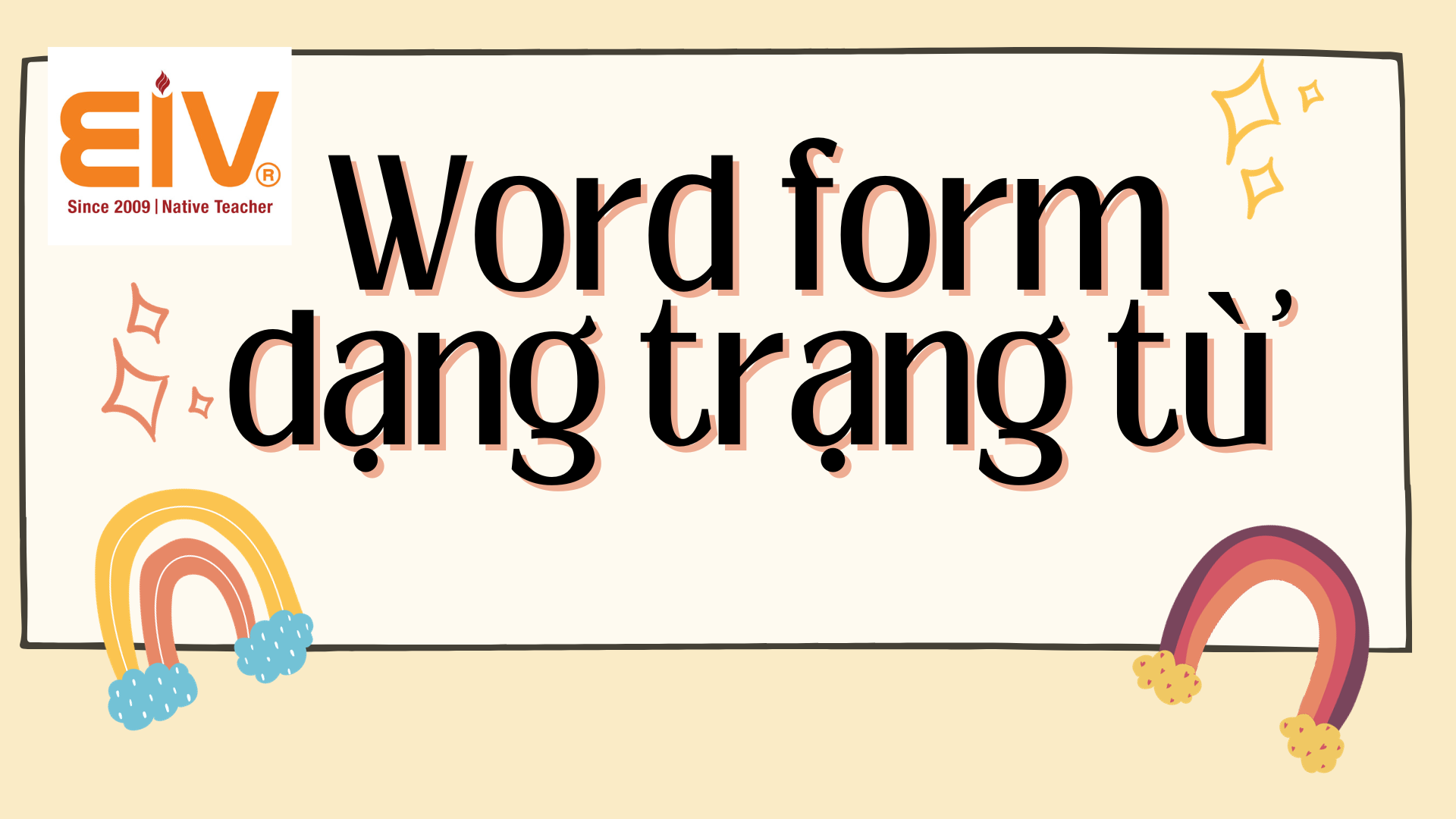Word form xuất hiện ở trong bài thường là những bài yêu cầu phải có sự hiểu biết rộng về vốn từ vựng, đòi hỏi người học phải có vốn từ vựng tốt và khi làm những bài tập này bạn cũng sẽ thu nạp thêm nhiều từ vựng hơn cho mình.
Word form trong tiếng Anh là gì?

Word form là dạng bài tập họ cho sẵn bạn một từ vựng bạn phải biến đổi nó sao cho phù hợp với ngữ cảnh trong câu. Mà từ bạn mới thay đổi phải đúng với câu đó, một từ có thể ở dưới dạng động từ, danh từ, tính từ, trạng từ,… tuỳ thuộc vào câu cần bỏ vào nó có thể biến đổi khác nhau.
Theo từ điển Cambridge, word form có bốn loại hình thành từ chính: tiền tố, hậu tố, chuyển đổi và từ ghép.
Cách học word form
Vì word form là bài tập thiên về từ vựng nên bạn không thể học hết toàn bộ từ ở nhiều trạng thái khác nhau, vậy nên bạn nên làm nhiều bài tập gặp từ đó ở nhiều hình thái càng làm nhiều bạn sẽ nhớ được. Bên cạnh đó bạn cần làm thêm bài tập ngữ pháp bởi vì ngữ pháp có sự ảnh hưởng đến hình thái của từ, nắm được ngữ pháp sẽ biết mình cần thêm vào đó là từ loại gì.
Các bước học word form
- Bước 1: Nhìn phía trước và phía sau thì cần điền và chỗ trống
- Bước 2: Xác định từ cần điền vào là danh từ/ động từ/ tính từ/ trạng từ.
Word form dạng danh từ

Vị trí của danh từ trong câu:
Danh từ đóng vai trò chủ ngữ trong câu, đứng trước động từ:
Ví dụ
- Leo is sitting next to his mother. (Leo đang ngồi cạnh mẹ anh ấy).
- Linh waters flower. (Linh đang tưới nước cho hoa).
Đứng phía sau tính từ sở hữu: my, your, her, his, our, their, its.
Ví dụ:
- My house is being fixed (Nhà của tôi đang được sửa).
- His cat died 2 year ago. (Con mèo của anh ta đã chết vào 2 năm trước).
Sau tính từ: nice, wonderful, beautiful,..
- Ví dụ:
- He is good man (Anh ấy là một người đàn ông tốt).
- That old woman works in hospital (Người phụ nữ kia làm việc ở bệnh viện).
Làm tân ngữ, đứng ngay sau động từ
Ví dụ:
- All living things need water.
- They hired employees.
Sau các giới từ: in, on, at,..
- Nga is good at drawing (Nga vẽ rất tốt).
- I am bad at math (Tôi không giỏi toán).
Sau các mạo từ the, a, an hoặc các từ this, that, these, those, each, every, both, no, some, any, few, a few, little, a little,…
- This movie is interesting movie.
- Every victim should have compensation money after a fire (Mỗi nạn nhân nên được bồi thường sau vụ hoả hoạn).
Các dạng word form của danh từ
Danh từ thường được cấu tạo từ các đuôi sau.
- -ment: development, arrangement, entertainment, establishment, payment, movement,….
- -tion: information, discussion, application, production, dedication, addition, ambition,…
- -ty/-ity: city, ability, royalty, certainty, security, personality, stupidity, nationality, activity, opportunity,…
- -ant: management, participant, inhabitant, attendant, servant, assistant, consultant,….
- -ness: kindness, aloneness, illness, happiness, freshness, readiness, forgetfulness, sadness, blindness, weakness,….
- -ship: scholarship, citizenship, relationship, partnership, hardship, leadership, friendship, membership, internship,….
- – or: operator, owner, mentor, driver, doctor, editor, director, supervisor,…
- -er: violence,confidence, examiner, builder, lawyer, driver, prisoner, foreigner,….
- -cy: urgency, efficiency, frequency
- -ism: Marxism, Maoism, Thatcherism
- -ence/ -ance: assistance, performance , insurance attendance, acceptance, endurance
Word form dạng tính từ

Vị trí của tính từ trong câu
Trước danh từ
- Blackpink is a popular girl group. (Blackpink là một nhóm nhạc nữ nổi tiếng).
- Lisa is a lovely girl (Lisa là một cô gái đáng yêu).
Sau động từ mang tính liên kết: tobe/ seem/ appear/ feel/ taste/ look/ keep/ get + adjective.
- This food taste sweet (Món ăn này có vị ngọt).
- He seems sad (Anh ấy trong có vẻ buồn).
Sau “ too”: S + tobe/ seem/ look … + too + adj
- She is too young to get married (Cô ấy còn quá nhỏ để kết hôn).
- He is too young to drive a car (Anh ấy còn quá nhỏ để lái xe).
Trước “enough”: S + tobe + adj + enough
- He is tall enough to play volleyball (Anh ấy đủ cao để chơi bóng chuyền).
- She is slim enough to try this dress (Cô ấy đủ thon gọn để mặc chiếc váy này).
Trong câu có cấu trúc: S + tobe + so adj that …
- The tea was so hot that I couldn’t drink it. (Tách trà quá nóng đến nỗi mà mình không thể uống được).
- Linh is so kind that everyone loves him. (Linh tốt bụng đến nỗi mọi người đều yêu quý cậu ấy).
Trong câu có cấu trúc keep/make + O + adj
- Kiên makes me happy (Kiên khiến tôi hạnh phúc).
- The sun keep us warm (Mặt trời khiến chúng tôi ấm áp).
Tính từ trong câu cảm thán: How + adj + S + V! hoặc What + (a/an) + adj + N!
- How well she sings! (Cô ấy hát hay quá).
- How cold it is! (Thời tiết thật lạnh!).
Trong câu so sánh hơn, so sánh nhất và so sánh bằng
So sánh bằng
They made a soup as good as I expected. (Họ đã làm một món súp thơm ngon như tôi chờ đợi).
He behaves as politely as his mother. (Anh ấy cư xử lịch sự giống như mẹ của anh ấy.)
So sánh hơn.
- This month’s sale project is more difficult than last month’s sale project. (Dự án kinh doanh tháng này khó hơn dự án kinh doanh tháng trước)
- Cherries are more expensive than apples (Quả cherry thì đắt hơn quả táo).
So sánh nhất
- He is the most handsome in his class. (Anh ấy là người đẹp trai nhất lớp).
- These shirt are the most cheap of all. (Chiếc áo này thì rẻ nhất trong tất cả.).
Các dạng word form của tính từ
Tính từ thường có cấu tạo từ các hậu tố sau:
- al/ ial:,normal,presidential, industrial,…
- able/ ible: comfortable, reliable, valuable, adaptable,…
- less: careless, endless, harmless, priceless, motionless, timeless,…
- y: rainy, angry, muddy, busy, sunny, wyndy, wealthy,…
- ic: romantic, classic, specific economic, toxic, heroic,…
- ful: careful, beautiful, wonderful, harmful, peaceful,…
- ish: childish, foolish, British, Irish,…
- ical: oficial, economical, aeronautical, comical, historical, alphabetical,musical, political, physical,…
- ive, -ative: expensive, native, attractive, active, decisive, alternative, talkative, creative,…
- eous, -ious, -ous: delicious, dangerous, spontaneous, humorous, hideous, poisonous, ambitious, anxious, notorious, famous, dangerous,…
- ed: interested, tired, excited, surprised,…
- ing: exciting, touching, interesting,…
Một số từ có đuôi ly thường được nhầm là trạng từ và chúng là những tính từ có dạng đặc biệt như: cowardly, friendly, manly, lively, lovely, smelly, (un) likely, miserly, scholarly, silly, ghastly,…
Word form dạng động từ

Vị trí của động từ trong câu
Thường đứng sau chủ ngữ
- I learn (Tôi học).
- He walks (Anh ấy bước).
Tùy vào ngữ cảnh của mỗi câu, mỗi đoạn văn mà động từ thường được chia với 3 dạng chính: Động từ nguyên mẫu (V-bare), động từ quá khứ cột 2 (V2) và động từ quá khứ cột 3 (V3).
|
STT |
Nguyên mẫu (V1) |
Quá khứ (V2) |
Quá khứ phân từ (V3) |
Nghĩa |
|
1 |
abide |
abode abided |
abode abided |
lưu trú tại đâu |
|
2 |
arise |
arose |
arisen |
phát sinh |
|
3 |
awake |
awoke |
awoken |
thức dậy/đánh thức ai |
|
4 |
backslide |
backslid |
backslid backslidden |
tái phạm |
|
5 |
be |
was/were |
been |
là, thì, bị, ở |
|
6 |
bear |
bore |
born |
chịu đựng/mang cái gì/đẻ con (người) |
|
7 |
beat |
beat |
beat beaten |
đập/đánh |
|
8 |
become |
became |
become |
trở thành |
|
9 |
befall |
befell |
befallen |
(cái gì) xảy đến |
|
10 |
begin |
began |
begun |
bắt đầu |
Bạn có thể tìm hiểu thêm các động từ khác: 360 động từ bất quy tắc.
Word form dạng trạng từ

Trạng từ thường dùng để bổ nghĩa cho động từ và tính từ.
Trước động từ thường
Ví dụ: They often visit their grandparents. (Họ thường xuyên thăm ông bà của họ).
Giữa trợ động từ và động từ thường
Ví dụ: I have recently finished my homework. (Gần đây tôi đã làm xong bài tập về nhà).
Giữa động từ tobe/seem/look và tính từ: S + tobe/ feel/ look … + adv + adj
Ví dụ: He is very kind.
Sau “too”: V + too + adv
Ví dụ: The man speaks too slowly (Người đàn ông nói quá chậm).
Trước “enough”: V+ adv + enough
Ví dụ: The teacher speaks loudly enough for all of her students to hear. (Giáo viên nói đủ lớn cho tất cả học sinh đều nghe).
Trạng từ bổ nghĩa cho tính từ trạng từ khác.
The recipe sounds really delicious. (Công thức này nghe thật sự ngon).
Bài tập vận dụng word form trong tiếng Anh
Điền từ vào chỗ trống
| STT | NOUN | VERB | ADJECTIVE | ADVERB |
| 1. | analyze | analytical | analytically | |
| 2. | identity | identifiable | identifiably | |
| 3. | editor | editorial | editorially | |
| 4. | economy | economize | economically | |
| 5. | individual | individuate | individual | |
| 6. | acquire | acquisitive | – | |
| 7. | resource | – | resourcefully | |
| 8. | tradition | – | traditional | |
| 9 | participation | participation | – | |
| 10. | conceive | conceptual | conceptually | |
| 11. | hypothesis | hypothetical | ||
| 12. | symbol | symbolize | ||
| 13. | investigate | investigative | – | |
| 14. | sustenance | sustainable | sustainably | |
| 15. | emerge | emergent | ||
| 16. | specifics | specific | ||
| 17. | remove | removable | ||
| 18. | ethics | – | ||
| 19. | implication | implied | ||
| 20. | evolution | evolutionary | ||
| 21. | flexibility | flex | ||
| 22. | deviate | deviant | ||
| 23. | margin | marginalize | ||
| 24. | pursuit |
Đáp án:
1. analysis
2. identify
3. edit
4. economic
5. individually
6. acquisition
7. resourceful
8. traditionally
9. participate
10. concept
11. hypothesize
12. symbolic
13. investigation
14. sustain
15. emergency
16. specify
17. removal
18. ethical
19. imply
20. evolve
21. flexible
22. deviation
23. marginal
24. pursue
Bài tập 2:
1. Linh is renowned for the………….. of bike. (PRODUCE)
2. If you make a good……………… at the interview, you will get the job. (IMPRESS)
3. Teaching and medicine are more than…………………., they’re professions. (OCCUPY)
4. My biology teacher has a vast…………………. of many race species. (KNOW)
5. You are never too old to go to school and gain some……………. (QUALIFY)
6. My greatest…………….. was winning a gold medal. (ACHIEVE)
7. The weatherman said there is a strong…………… of snow today. (POSSIBLE)
8. Some old laws are no longer……………….. (EFFECT)
9. Athens is…………………. for its ancient buildings. (FAME)
10. He was caught shoplifting money so now he has a……………….. record. (CRIME)
11. Despite her severe………….., she fulfilled her goals in work. (DISABLE)
12. Being……………. is the worst thing that can happen to someone. (EMPLOY)
13. If you buy presents in the back friday your…………………… can be very high. (SAVE)
14. Due to the pilot’s…………………, the co-pilot managed to land safely. (GUIDE)
15. It’s important to also see the less………………… sides of the job. (DESIRE)
16. I was surprised at his………………… to give up. (REFUSE)
17. Children are by nature………………….. of danger. (AWARE)
18. She is always……………. towards her parents. (RESPECT)
19. The hospital has the best medical……………. and fast ambulances. (EQUIP)
20. You can relax in the comfortable………………….. of the stay home. (SURROUND)
Đáp án
1. production
2. impression
3. occupations
4. knowledge
5. qualification
6. achievement
7. possibility
8. effective
9. famous
10. criminal
11. disability
12. unemployed
13. savings
14. guidance
15. desirable
16. refusal
17. unaware
18. Respectful
19. equipment
20. surroundings
EIV xin gửi đến bạn những kiến thức xoay quanh về word form trong tiếng Anh, mong bạn có thể tận dụng những kiến thức đó trong học tập và đời sống. Nếu bạn muốn đẩy nhanh quá trình học tiếng Anh hoặc bạn đang đi làm thì có thể tham khảo khoá học Tiếng Anh 1 kèm 1 cùng với giáo bản ngữ tại EIV bạn nhé!





 Hồ Chí Minh: 028 7309 9959 (Phím 1)
Hồ Chí Minh: 028 7309 9959 (Phím 1)
